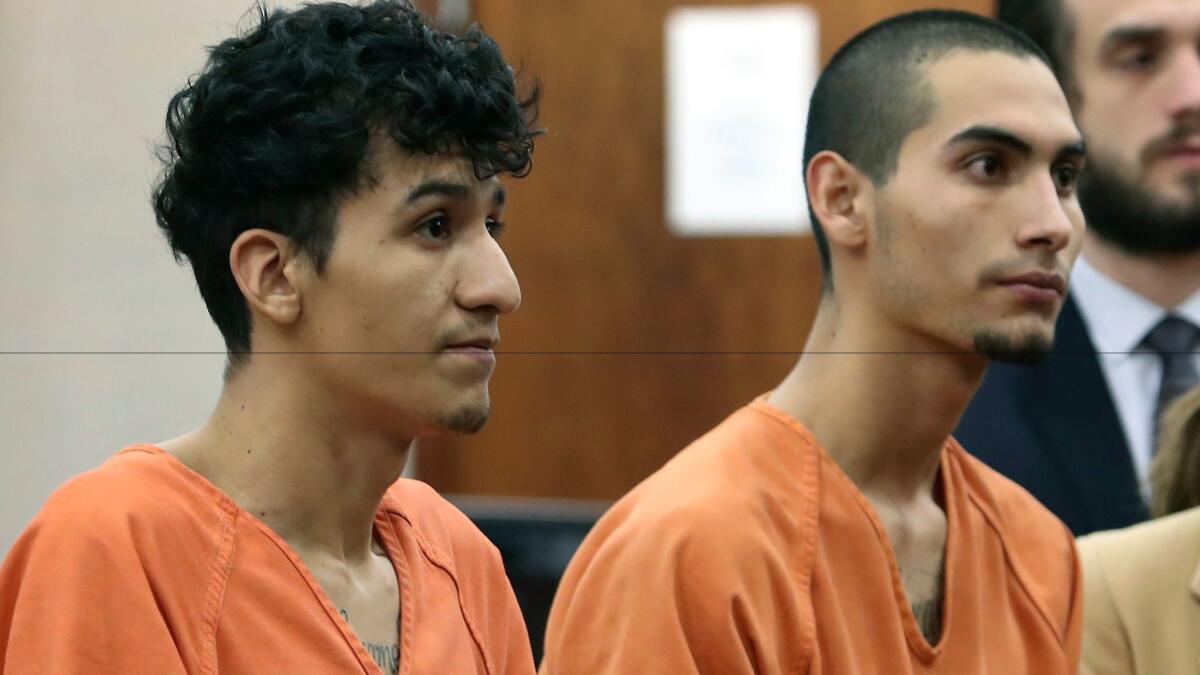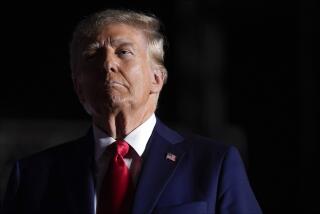Trump administration says lax immigration enforcement is enabling violent gangs like MS-13

Reporting from Washington — Led by President Trump, top administration officials on Tuesday blamed what they called lax immigration enforcement for the rise of MS-13, the bloody crime cartel spawned in the streets and jails of Los Angeles, and promised a stronger federal response.
Tweeting before dawn, Trump called his predecessor weak on illegal immigration and said, without evidence, that the Obama administration “allowed” the Mara Salvatrucha gang, also known as MS-13, to form in America.
“The weak illegal immigration policies of the Obama Admin. allowed bad MS 13 gangs to form in cities across U.S. We are removing them fast!” the president wrote on Twitter at about 5:40 a.m.
MS-13 was founded in Los Angeles in the 1980s by immigrants fleeing a civil war in their native El Salvador, and it has expanded in scope and violence ever since.
An FBI task force has investigated the transnational crime group since 2007, working with law enforcement in El Salvador, Honduras and Guatemala. In 2008, before Obama was elected, the FBI said MS-13 was active in at least 42 states.
In separate speeches Tuesday, Atty. Gen. Jeff Sessions and Homeland Security Secretary John F. Kelly both vowed to take a tougher approach to such cartels, but offered few details as to what that would entail.
Speaking to a meeting of organized crime task forces at the Justice Department, Sessions said MS-13 had expanded because of a porous Southwest border and “sanctuary cities” that refuse to cooperate with immigration agents.
“Because of an open border and years of lax immigration enforcement, MS-13 has been sending both recruiters and members to regenerate gangs that previously had been decimated,” he said.
MS-13 also had smuggled members across the border “as unaccompanied minors,” Sessions said.
“They are not content to simply ruin the lives of adults — MS-13 recruits in our high schools, our middle schools and even our elementary schools,” Sessions said.
The Justice Department meeting was supposed to kick off an effort to find new strategies to battle the cartels.
Before he became the nation’s top law enforcement officer, Sessions had focused on curbing legal and illegal immigration during his nearly four terms in the Senate, and his opposition helped block attempts to reform immigration laws.
Kelly told an audience at George Washington University that MS-13 was “one of the greatest hazards” facing the country.
“They are utterly without laws, conscience or respect for human life,” he said. Noting their purported role in smuggling immigrants into the United States, he added, “They send them on a course north that rivals Dante’s journey into hell.”
According to the FBI’s National Gang Intelligence Center, MS-13 has 30,000 members worldwide and about 10,000 in the United States.
After the U.S. government jailed and deported many MS-13 members in the 1990s, the group formed a new power base in El Salvador. Since then, federal authorities say, it has sent members north to fill depleted ranks and seek new territory, often in bloody turf wars.
Police in Central Islip, a Long Island suburb of New York City, said last week, for example, that they believed MS-13 members brutally beat and killed four young men, ages 16 to 20, months after six other bodies were found.
In a recent speech in Arizona, Sessions spoke about MS-13 in lurid terms.
“When we talk about MS-13 and the cartels, what do we mean? We mean criminal organizations that turn cities and suburbs into war zones, that rape and kill innocent citizens and who profit by smuggling poison and other human beings across our borders,” he said. “Depravity and violence are their calling cards, including brutal machete attacks and beheadings.”
One expert who has studied the group says that, while MS-13 is “extremely violent and very proud of that violence,” Sessions has exaggerated the threat.
“Part of this is scapegoating to serve his agenda,” said Luis Salinas, a sociology professor at the University of Houston. “What he’s basically trying to do is demonize them and make them guilty of every possible crime, and use scare tactics to justify a crackdown on crime.”
Salinas says up to 40% of gang members are born in the U.S. and said he hasn’t seen evidence of a widespread effort to smuggle more members across the border.
[email protected] | Twitter: @jtanfani
More to Read
Get the L.A. Times Politics newsletter
Deeply reported insights into legislation, politics and policy from Sacramento, Washington and beyond. In your inbox three times per week.
You may occasionally receive promotional content from the Los Angeles Times.











